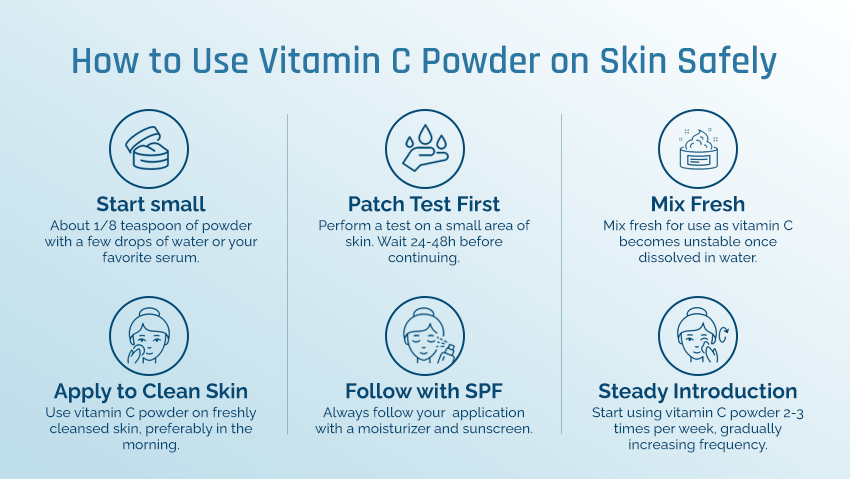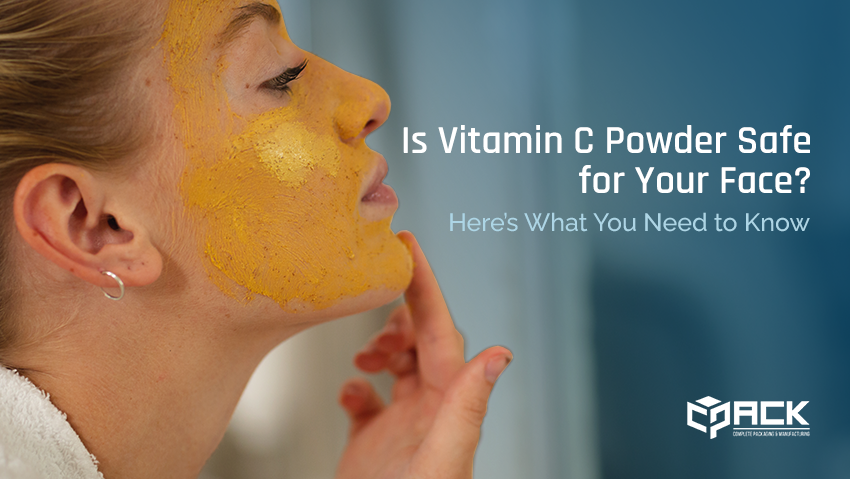Vitamin C has long been hailed as a skincare superhero, and for good reason. This powerful antioxidant offers numerous benefits for skin health, from brightening dark spots to boosting collagen production.
But when it comes to vitamin C powder specifically, many people wonder: Is vitamin C powder safe for your face application? The answer is largely yes, but there are important considerations to keep in mind.
Understanding Vitamin C Powder for Skincare
Vitamin C powder, typically containing L-ascorbic acid in its pure form, has gained popularity as a skincare ingredient due to its stability and potency.
Unlike liquid vitamin C serums that can degrade quickly when exposed to light and air, powdered vitamin C remains stable until mixed with water or other liquids, making it an attractive option for those seeking maximum potency.
Research shows that vitamin C has an excellent safety profile and finds increasing use in photoaging, hyperpigmentation, tissue inflammation and promotion of tissue healing. This scientific backing provides confidence in its topical application, though proper usage remains crucial.
Vitamin C Powder Benefits for Face

The benefits of using vitamin C powder on your skin are well-documented and impressive. Here’s what this powerhouse ingredient can do for your complexion:
- Antioxidant Protection: Vitamin C acts as a potent antioxidant, protecting your skin from free radical damage caused by environmental stressors like UV radiation and pollution. This protection helps prevent premature aging and maintains overall skin health.
- Collagen Synthesis: One of the most significant vitamin C powder benefits for face application is its role in collagen production. Vitamin C is essential for collagen synthesis, which helps maintain skin elasticity, firmness, and reduces the appearance of fine lines and wrinkles.
- Brightening Effects: Regular use of vitamin C can help fade dark spots, hyperpigmentation, and acne scars. Topical vitamin C inhibits the production of melanin, which is what gives skin its color, leading to a more even skin tone and brighter complexion.
- Anti-inflammatory Properties: Vitamin C possesses anti-inflammatory properties that can help calm irritated skin and reduce redness, making it beneficial for various skin conditions.
For those looking to bulk purchase or private label vitamin C, consider services for private label vitamin C supplements that can support overall health while you treat your skin externally.
How to Use Vitamin C Powder on Skin Safely?
- Start Small: Begin with a tiny amount of powder (about 1/8 teaspoon) mixed with a few drops of water or your favorite serum. This creates a paste-like consistency that’s easy to apply.
- Patch Test First: Before applying to your entire face, perform a patch test on a small area of skin, preferably behind your ear or on your inner wrist. Wait 24-48 hours to ensure no adverse reactions occur.
- Mix Fresh Each Time: Only mix what you plan to use immediately, as vitamin C becomes unstable once dissolved in water. This ensures maximum potency and effectiveness.
- Apply to Clean Skin: Use vitamin C powder on freshly cleansed skin, preferably in the morning to take advantage of its photoprotective properties throughout the day.
- Follow with Moisturizer and SPF: Always follow your vitamin C application with a good moisturizer and broad-spectrum sunscreen, especially during daytime use.
- Gradual Introduction: Start using vitamin C powder 2-3 times per week, gradually increasing frequency as your skin builds tolerance.
Potential Vitamin C Powder Side Effects
While vitamin C is generally safe for most people, it’s important to be aware of potential vitamin C powder side effects. Understanding these can help you use the product more safely:
The most common side effect is mild irritation, especially when first starting use. This may manifest as redness, stinging, or a burning sensation, particularly in those with sensitive skin.
High concentrations of vitamin C can be drying, leading to flaky or peeling skin. This is more likely to occur if you use too much product or apply it too frequently initially. While vitamin C provides some photoprotection, it can initially make your skin more sensitive to sun exposure. This makes daily sunscreen use absolutely essential.
Pure L-ascorbic acid has a low pH (around 3.5), which can be too acidic for some skin types, causing irritation or disrupting the skin’s natural barrier function. Infarct, in rare cases, vitamin C can cause temporary yellowish staining of the skin, particularly if used in very high concentrations or if the powder has oxidized.
If you’re considering combining vitamin C with other nutrients for enhanced benefits, products like Iron 10mg + Vitamin C 26mg can provide synergistic effects for overall health support.
DIY Vitamin C Skincare: Tips and Precautions
Creating your own DIY vitamin C skincare treatments can be rewarding and cost-effective, but it requires careful attention to safety and proper formulation. Here are essential guidelines:
1. Choose Quality Powder
Invest in pharmaceutical-grade L-ascorbic acid powder from reputable suppliers. Avoid products with additives or fillers that might irritate your skin.
2. Proper Storage
Store your vitamin C powder in a cool, dry, dark place, preferably in an airtight container. Exposure to light, heat, and moisture will degrade the vitamin C, making it less effective and potentially irritating.
3. pH Considerations
Pure vitamin C powder creates a very acidic solution when mixed with water. Consider mixing it with a pH-balancing ingredient like sodium bicarbonate (baking soda) in tiny amounts, or use it alongside hydrating serums to buffer the acidity.
4. Concentration Guidelines
Start with concentrations between 5-10% for beginners. More experienced users might tolerate up to 20%, but higher concentrations aren’t necessarily better and can increase irritation risk.
5. Mixing Partners
Vitamin C pairs well with hyaluronic acid, niacinamide (in separate applications), and vitamin E. Avoid mixing with retinoids, AHAs, or BHAs in the same application to prevent over-exfoliation.
Getting Vitamin C Powder for Glowing Skin: What to Expect
When incorporating vitamin C powder for glowing skin into your routine, patience and consistency are key. Here’s a realistic timeline of what to expect:
Week 1-2: You may notice improved skin texture and a subtle brightening effect. Some people experience initial purging or mild irritation as skin adjusts.
Week 3-4: Skin tone begins to appear more even, and any initial irritation should subside. The glow becomes more noticeable as cellular turnover improves.
Month 2-3: Significant improvements in hyperpigmentation, fine lines, and overall skin radiance become apparent. This is when many people see the most dramatic results.
Month 3+: Continued use maintains and enhances results, with ongoing protection against environmental damage and sustained collagen production.
According to Harvard Health, consistent use of topical vitamin C can provide major benefits for skin health when used appropriately.
Is Vitamin C Powder Safe For Your Face?
Topical vitamin C is generally considered safe during pregnancy and breastfeeding, but consult with your healthcare provider before starting any new skincare regimen While topical vitamin C rarely interacts with medications, those taking blood thinners or other medications should consult their doctor before use.
People with rosacea, eczema, or other inflammatory skin conditions should be particularly cautious and may want to consult a dermatologist before using vitamin C powder.
Vitamin C has only been studied in adults and is not recommended for children, so keep vitamin C skincare products away from young children.
Conclusion
Vitamin C powder can be a safe and highly effective addition to your skincare routine when used properly. Its stability, potency, and proven benefits make it an excellent choice for those seeking brighter, healthier skin. However, success lies in proper application, gradual introduction, and listening to your skin’s needs.
Remember to start slowly, perform patch tests, and always use sunscreen when incorporating vitamin C into your routine. With patience and consistency, vitamin C powder can help you achieve the glowing, healthy complexion you’re seeking while maintaining safety as your top priority.
Whether you’re dealing with hyperpigmentation, signs of aging, or simply want to enhance your skin’s natural radiance, vitamin C powder offers a powerful, research-backed solution that can transform your skincare routine when used correctly.






